Portuguese Translation

If you require professional language services in Portuguese, Target Language Translation Services offers a complete set of professional advice to meet the needs of its worldwide customers.
Target Language Translation Services is an ISO certified translation agency with mature localization processes, allowing us to consistently deliver quality English-Portuguese translations at an affordable cost. We support a variety of accurate localization practices such as translation memory, terminology management, and modern machine translation facilities.
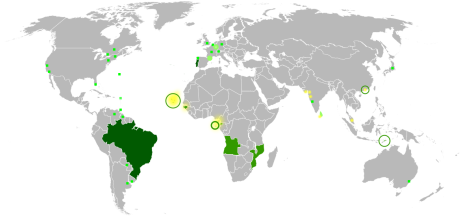
Native language
Official and administrative language
Cultural or secondary language
Portuguese-speaking minorities
Portuguese-based creole languages
About Portuguese
Portuguese is a Romance language spoken by about 255 million people. It is the official language of Portugal, Brazil, Cape Verde, Guinea-Bissau, Mozambique, Angola and São Tomé and Príncipe, and is a co-official language in East Timor, Equatorial Guinea and Macau. These Portuguese-speaking countries and regions are known as Lusophone (Lusófono) and are part of Lusofonia or the Lusophone World (Mundo Lusófono). These names originate from Lusitania, the Roman province that covered more or less the same area as modern Portugal.
Number of speakers
There are about 212 million Portuguese speakers in Brazil, 18 millioin in Angola, 10 million in Mozambique, 9.9 million in Portugal, 396,450 in Guinea-Bissau, 367,800 in the Cape Verde Islands, 197,000 in São Tomé e Principe, 18,680 in Macau, and 5,600 in East Timor. Other countries with significant numbers of Portuguese speakers include France (1 million), the USA (714,018), Switzerland (309,270), Japan (270,000), Venezuela (254,000), India (250,000), Canada (222,000) and Paraguay (212,000). The language is spoken by smaller numbers of people in many other countries.
Portuguese is taught as a foreign language in such countries as South Africa, Argentina, Venezuela, Zambia, Senegal, Paraguay, Congo and Uraguay, where it is a compulsory subject.
History of Portuguese
Portuguese is a descendent of Latin, which was brought to the Iberian Peninsula by Roman soldiers, settlers and merchants from 216 BC. The Latin in that area was influenced by the Hispano-Celtic languages that were spoken there at the time.
After the Western Roman Empire collapsed in the 5th century AD, Germanic peoples, such as the Suebi, Visigoths and Buri invaded and settled in Iberia. The quickly adopted Latin and Roman culture, and integrated with the local population.
In 711 AD, the Moors from North Africa began to invade and occupy southern parts of Iberia. Arabic became the main language in their conquered territory, and some words were borrowed from Arabic into local varieties of languages during this time.
It is thought that by about 600 AD, an early form of Galician-Portuguese was being spoken in the Kingdom of the Suebi in the nortwest corner of Iberia. By 800 AD this language was spoken throught the northwest of Iberia.
The earliest records of a distinctly Portuguese language appear in administrative documents dating from the 9th century AD from the Kingom of Galicia, which corresponds to modern Galicia in Spain, and part of northern Portugal. This language was known as Galician-Portuguese or Proto-Portuguese.
The period between the 12th and 14th centuries is known as the Galician-Portuguese period. Portuguese became the preferred language of lyric poetry in Christian Hispania. There was no standard way to write the language, however one popular orthography, based on Occitan, was probably devised by Gerald of Braga, a monk from Moissac, who became Bishop of Braga in 1047.
Portugal became independent in 1139. In 1290, King Dinis I (1261-1325) decreed that Portuguese, which was called the "common language", should be known as the Portuguese language and should be officially used in Portugal. Poetry and songs were the main form of Portuguese literature at that time, and King Dinis himself wrote quite a few poems.
From the 13th century Portuguese literature included prose works such as chronicles, lives of saints and treatises on genealogy.
From the 15th century the Portuguese began to colonise parts of Africa, Asia and the Americas, taking with them their language. By the mid-16th century, Portuguese was used in Asia and Africa in colonial administration, and as a lingua franca between the Portuguese, other Europeans and local people. Portuguese-based creoles also began to emerge during this time.
Modern Portuguese began to develop in the 16th century. At that time Portuguese speakers who were literate in their own language, were also literate in Latin, and borrowed many words from Classical and Renaissance Latin, and from Classical Greek.
A reformed Portuguese orthography (nova ortografia), in which words were spelled more in accordance with their pronunciation, was adopted is Portugal in 1916. A slightly modified form was adopted in Brazil in 1943 and revised in 1970. A new orthography which aims to unify the written Portuguese of all the lusophone countries was adopted in Brazil in 2009. Dates have yet to be set for its adoption in the other Portuguese-speaking countries
Portuguese alphabet and pronunciation
European Portuguese alphabet
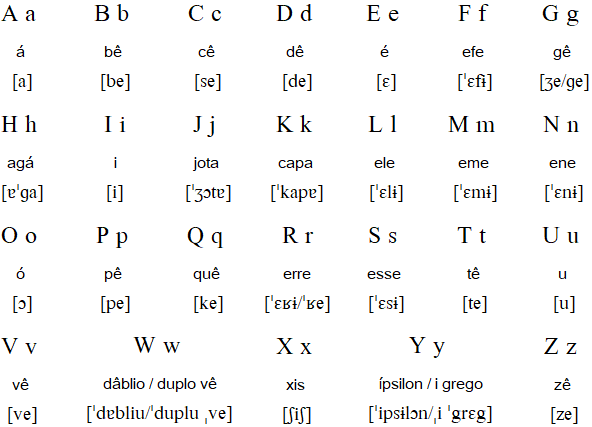
The letters K, W and Y are used only in foreign loan words.
Pronunciation of European Portuguese
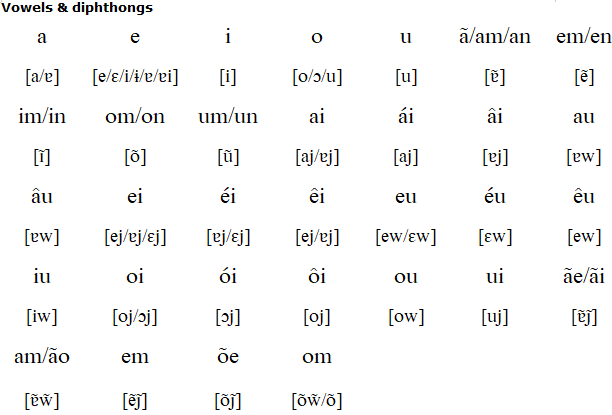
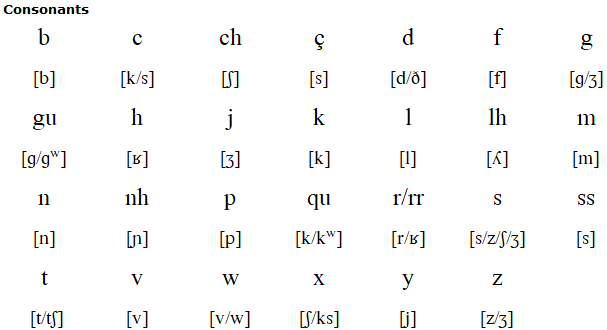
Notes
a = [ə] when unstressed or at the ends of words, [a] or [ɐ] elsewhere.
Between vowels b = [β]; d = [ð]; g = [ɣ]
c = [s] before jor e, [k] elsewhere
e = [ə] when unstressed or at the ends of words, [e] or [ɛ] elsewhere. Often barely pronounced at the ends of words.
gu = [ɡʷ] before jor e, [ɡ] elsewhere
r = [ʀ] or [rr] when at the beginning of words, [r] elsewhere
l often = [ɫ]
s = [s] at the beginning of words, [z] between vowels and at the end of a word when preceded by a vowel and followed by a word beginning with a vowel, e.g. os Estados Unidos [uz eʃtaduz uniduʃ], [ʃ] after a vowel and before and consonant and at the end of syllables.
z = [ʒ] at the end of words, [z] elsewhere
Brazilian Portuguese alphabet
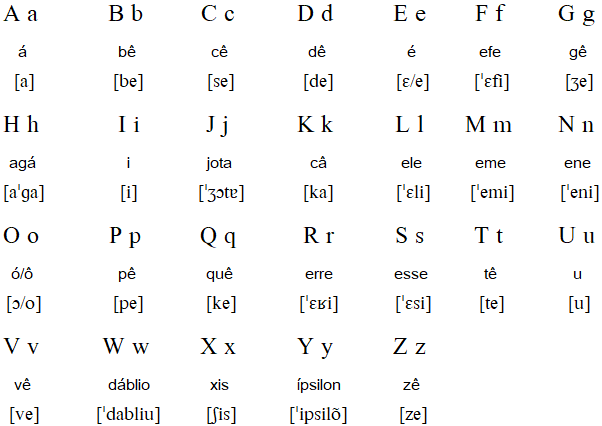
The letters K, W and Y are used only in foreign loan words.
Pronunciation of the Portuguese of Brazil
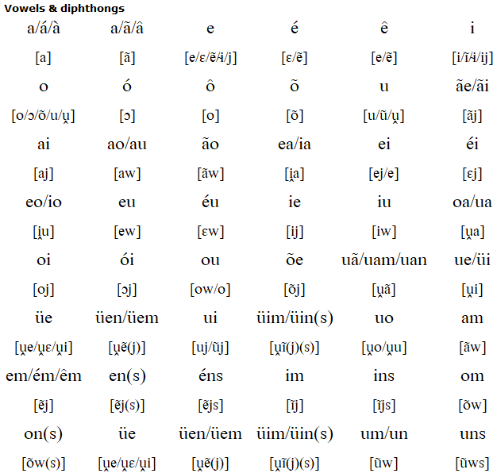
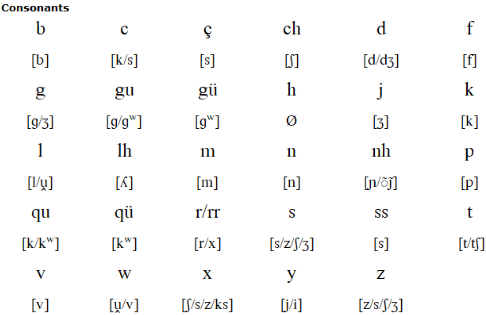
Notes
e = [e] when unstressed and non-final, [e] or [ɛ] when stressed, [i] when final
o = [o] when unstressed and non-final, [ɔ] or [o] when stressed, [u] when final
oa = [oa/owa] when stressed, oa &ua = [ṷa] when unstressed
the diphthongs ea, eo, ia, ie, io, oa, ua, ue and uo appear at the ends of words and are always unstressed. ua and uo can also appear after g and q, and in other positions.
c = [s] before i or e, [k] elsewhere
d = [ʤ] before i or a final unstressed e, [d] elsewhere. However in parts of Santa Catarina and Paraná and the north and north east of Brazil, d in the final -de is pronounced [d]. In those same regions (except Paraná) djis pronounced [di] or [dʲi].
g = [ɣ] between vowels and [ɡ] elsewhere
gu = [ɡ] before i or e, [ɡʷ] elsewhere
Triphthongs are made up of combinations of gu, gü, qu, qü + a diphthong, e.g. saguão, agüei, sequóia.
l = [ṷ] after vowels (final e before consonants).
m is nasalized when at the end of a syllable and preceded by a vowel, e.g. cantam [´kãtãʷ], homem ['omẽj̭], sim [sĩj̭].
n is nasalized when at the end of a syllable, preceded by a vowel and followed by a consonant, e.g. cansar [kã'sa], alento [a'lẽtu].
nh = [~j], i.e. nasalizes preceeding vowels, e.g. banha ['bãija]. In some north eastern parts of Brazil, inha = [ĩa] and -inho = [ĩu]. In some parts of Brazil, nh = [ɲ]
qu = [k] before i or e, [kʷ] before a or o
r = [x~ʀ] (or [r~ɾ] in some areas) at the beginning of words and after n
r = [Ø~x~ʀ~r~ɾ] at the ends of words and before consonants. If the following word begins with a vowel, r = [r~Ø]
r = [r] after consonants (except n)
rr = [x~ʀ] (or [r~ɾ] in some areas)
r = [ɽ] before consonants and at the end of words in São Paulo, south of Brasil, Minas Gerais and Goiás
s = [s] at the beginning of words, [z] between vowels and between voiced consonants. However in parts of Santa Catarina, Rio de Janeiro and the north east and north of Brazil, s = [ʒ] before d, g, l, m, n, r and v, [ʃ] before c, f, p, qu and t, and when in final position.
sc (before e and i) and sç (before a and o) = [s]. In Rio de Janeiro, sc/sç = [is], e.g. nascimento [naisi'mẽtu]
t = [ʧ] before i or a final unstressed e, [t] elsewhere. However in parts of Santa Catarina and Paraná and the north and north east of Brazil, the final t in the final -te is pronounced [t]. In those same regions (apart from Paraná) tj= [ti] or [tʲi]. The [ʧ] sound is also written tch (e.g. tchau), or tx in indigenous names (e.g. txukahamãe).
x = [ʃ] at the beginning of a word and, in parts of Santa Catarina, Rio de Janeiro and northeast and north of Brazil, before c, p and t
ex + vowel = [z], e.g. exame [e'zãmi], or [ʃ], e.g. vexame [ve'ʃami]
x = [ʃ], [ks] or [s] elsewhere, e.g. relaxar [xela'ʃa], fixo ['fiksu], auxiliar [aʷsi'lj̭a(x/r)]
x = [ks] when in final position
x is silent in exce-, exci-, exs-, e.g. exceto [e'sɛtu], excitar [esi'ta], exsudar [esu'da]
z = [s] in final position and before unvoiced consonants. In parts of Santa Catarina, Rio de Janeiro and the north east and north of Brazil, z = [ʒ] before voiced consonants, [ʃ] before unvoiced consonants and when in final position.
In the north east of Brazil some of the letters have different names: F (fê), J (ji), L (lê), M (mê), N (nê), R (rê), S (si) and Y (ipsilone).
How much does the translation from English into Portuguese cost?
The standard rate for translations from English into Portuguese is $ 0.12. For urgent jobs that need several linguists working simultaneously, we will apply a surcharge.
Just contact us to get more information and a no-obligation quote. Our project managers can be reached via telephone, email, or the form. We look forward to serving you.
For more information about Portuguese translation,
call us or add wechat today at +86-13616034782
or send us an email to:info@target-trans.com